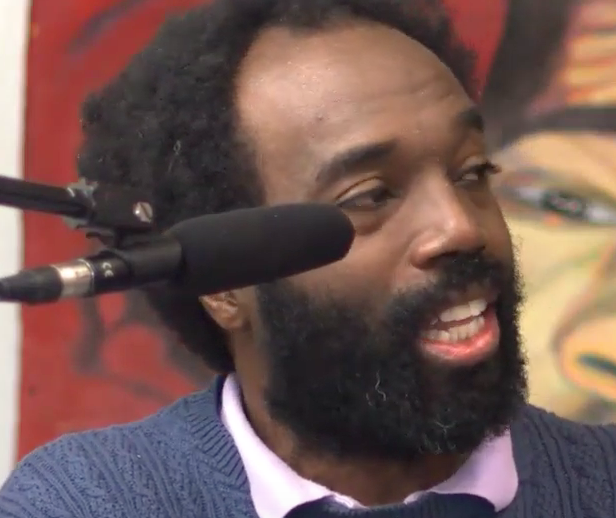You have /5 articles left.
Sign up for a free account or log in.

Irami Osei-Frimpong
YouTube
The University of Georgia says it is “vigorously exploring all available legal options” regarding a black graduate student’s provocative comments about race.
That the university is investigating the student’s comments at all has drawn criticism from the Foundation for Individual Rights in Education and other scholars. They object, in part, because the student’s comments were brought to light by a political activist who urged donors to stop supporting Georgia after it initially declared the speech protected.
“The First Amendment does not permit [the university] to subject the expressive rights of faculty members or students to the whims of donors, students, or members of the public who find those views uncomfortable, objectionable or deeply offensive,” FIRE wrote in a letter late last month to Jere W. Morehead, Georgia’s president.
Georgia already condemned the teaching assistant’s expression, and the First Amendment “prevents the institution from taking any further steps,” the group wrote. Instead, the university “must immediately abandon its investigation into protected expression.”
The university, meanwhile, is seeking guidance from the state’s attorney general on what actions “we can legally consider in accordance with the First Amendment,” it said in a statement. “Racism has no place on our campus, and we condemn the advocacy or suggestion of violence in any form.”
The student, Irami Osei-Frimpong, a Ph.D. candidate in philosophy, said Sunday that he’d just learned that the university is not only looking into his comments but also disclosure issues on his Ph.D. program application. A notice from the Office of Student Conduct cites his alleged failure to disclose that he'd previously attended the University of Chicago and had been arrested for trespassing.
Osei-Frimpong said he didn't disclose a prior misdemeanor trespassing arrest during an Occupy Chicago-related protest in 2011 because he didn't think it mattered to his application, as the charges -- about being in Grant Park after a curfew that was ultimately deemed unconstitutional -- were dismissed. Nor did he think his previous enrollment in a political science graduate program mattered, he said, since he applied to Georgia's philosophy program after two faculty members left Chicago and on that application noted his master's degree in philosophy from Brandeis University.
Now it appears Osei-Frimpong's future at Georgia is at risk. He said he suspects the conduct charges are about retaliation for his comments on race.
A political philosopher who studies institutional racism, Osei-Frimpong is outspoken on social media and on his YouTube series The Funky Academic. In one example of a comment that has since been held against him as racist or violent, Osei-Frimpong said that “some white people may have to die for black communities to be whole in this struggle to advance freedom.” The California native also once said that he feels as if he’s around a “bunch of sociopaths” among whites in the South.
These declarations have spread far beyond their original reach in recent days, since the activist Andrew Lawrence alerted donors that the university was “not willing to properly ensure the safety and respect of its student body.”
Lawrence wrote his open letter to fellow Georgia alumni after the university’s Equal Opportunity Office first responded to his complaint about Osei-Frimpong. The office determined that the graduate student’s comments were personal views expressed on a private platform, but said that Lawrence should notify it of specific instances of discrimination or harassment related to the campus.
Lawrence, who graduated from Georgia last year, also circulated a video of a himself confronting Osei-Frimpong at a meeting of the Young Democrats. The video includes other students encouraging Lawrence to engage in dialogue rather than interrupt the meeting.
Some of Osei-Frimpong’s statements now making the rounds on political blogs are detached from their original contexts. The comment about sociopaths, for example, was a reference to how Osei-Frimpong says Southerners learn manners -- “as a series of behaviors the way autistic kids learn to read social cues for behaviors.” Except, he said, “since these guys and gals aren't autistic, I just feel like I'm around a bunch of sociopaths.”
Osei-Frimpong recently visited with Tim Bryant, a white, conservative local radio host, to explain his comments about racial struggle and violence.
Asked by Bryant if he was one of white people who “needs to die,” Osei-Frimpong recalled the death of the Charlottesville, Va., anti-white supremacist protester Heather Heyer in 2017, saying, “It’s just a fact of history that racial justice often comes at the cost of white life.” He added, “Slaves asked nicely to be let off the plantation, but that didn’t happen.”
Addressing one past statement about Georgia suburban neighborhoods raising white supremacists, Osei-Frimpong told Bryant, “I never said that all kids in suburban Georgia are white supremacists.” But it wouldn’t surprise him to meet one -- something like running into a Georgia Bulldogs fan on the streets of Athens, Ga., he said.
In a new Funky Academic video about the matter, Osei-Frimpong sums up his message as, “A rising tide does not lift all boats, especially if they’re black boats.” He also says that the university “changed its tune” regarding his comments “once donors got involved.”
Asked to clarify exactly what he meant about race and violence, Osei-Frimpong said via email, "Of course I don't want white people killed arbitrarily. I want the wealth gap closed and that entails a massive redistribution of assets and resources in a way that's never happened for black communities, and in a nation where every inch closer has come with blood. So much so that we've simply stopped trying to right the wrongs of racial terrorism and have consigned black communities to a caste system. That's the story of us ending Reconstruction."
In context or not, Osei-Frimpong’s comments remain controversial. In a Jan. 26 post to Medium, for example, Osei-Frimpong said he’d been banned from Facebook for 30 days for a post on race and violence. His reposted Facebook statement says the idea that white people “have to die for freedom isn’t particularly shocking … I think what’s offensive is the notion that some white people have may have to die for black people to be free.”
Osei-Frimpong has cited Tommy Curry, a professor of philosophy at Texas A&M University whose past comments about race were unearthed by a conservative publication in 2017. “In order to be equal, in order to be liberated, some white people might have to die,” Curry was quoted as saying in an article called “When Is It OK to Kill Whites?”
Curry’s quote was accurate but devoid of context -- in that case a conversation inspired by Quentin Tarantino's Django Unchained. Texas A&M first supported Curry’s right to academic freedom and then strongly rejected his views after public calls for his termination grew.
Curry weathered death threats but held on to his tenured faculty position. Graduate students have fewer assurances of academic freedom.
The American Association of University Professors recognizes that gradate students have academic freedom and due process rights as employees. But it maintains that their academic freedom is more limited than faculty members’ in the areas of teaching and research because they work under supervision.
In the public political domain, however, graduate students "should have the same freedom of action" as faculty members, reads AAUP’s Statement on Graduate Students.
Disciplining a graduate student employee with dismissal for their extramural speech would require the same sort of connection to professional fitness that's expected in cases against faculty members, said Hans-Joerg Tiede, associate secretary for academic freedom, tenure and governance at the association.





